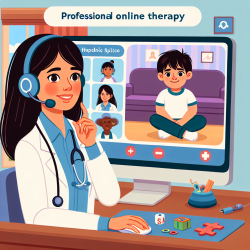As practitioners dedicated to improving the lives of children with neurodevelopmental disorders (NDDs), it is crucial to utilize evidence-based tools that provide reliable and comprehensive assessments. The recent validation of PleaseApp, a digital tool for assessing receptive pragmatic abilities, offers an exciting opportunity to enhance our practice and create better outcomes for children.
Pragmatic skills are essential for social communication and interaction. These skills include understanding figurative language, narrative construction, indirect speech acts, humor, gesture-speech integration, politeness, and complex intentionality. Children with NDDs often face challenges in these areas, which can hinder their ability to participate in social activities and academic settings.
Traditional assessment tools often fall short in providing a complete picture of a child's pragmatic abilities, especially in the receptive domain. PleaseApp addresses this gap by offering a comprehensive assessment of eight pragmatic skills. The tool was designed based on extensive empirical research and has demonstrated good reliability and validity in a study involving 150 typically developing children aged 5 to 12 years.
Here are some key outcomes from the research that practitioners can implement to improve their assessment practices:
- Comprehensive Assessment: PleaseApp evaluates eight key pragmatic skills: figurative language, narrative, reference, indirect speech acts, humor, gesture-speech integration, politeness, and complex intentionality. This multidimensional approach allows practitioners to identify specific areas of strength and weakness in a child's pragmatic abilities.
- Evidence-Based Design: The tool's design is grounded in scientific research on developmental pragmatics. This ensures that the assessment is not only comprehensive but also accurate and reliable.
- Digital Format: As a digital tool, PleaseApp provides a motivating and engaging environment for children. It leverages multimedia elements such as audio, images, and interactive tasks to create realistic communicative contexts, making the assessment process more enjoyable and less anxiety-inducing for children.
- Telehealth Compatibility: The digital nature of PleaseApp makes it suitable for both face-to-face and remote assessments. This is particularly valuable in the context of the COVID-19 pandemic, which has necessitated the adoption of telehealth practices.
- Objective Scoring: Each item in PleaseApp is scored based on pragmatic appropriateness, accuracy, and veracity. This objective scoring system helps practitioners to precisely identify the types of errors children make and understand the underlying causes of their pragmatic difficulties.
Implementing PleaseApp in your practice can significantly enhance your ability to assess and address the pragmatic needs of children with NDDs. By providing a detailed profile of a child's pragmatic skills, you can develop personalized intervention plans that target specific areas of difficulty, thereby improving their social communication and overall quality of life.
For those interested in delving deeper into the research and methodology behind PleaseApp, I encourage you to read the original research paper: Validation of PleaseApp: a digital tool for the assessment of receptive pragmatic abilities in children with neurodevelopmental disorders.
In conclusion, PleaseApp represents a significant advancement in the assessment of pragmatic skills in children with NDDs. By integrating this tool into your practice, you can make data-driven decisions that lead to better outcomes for the children you serve.










